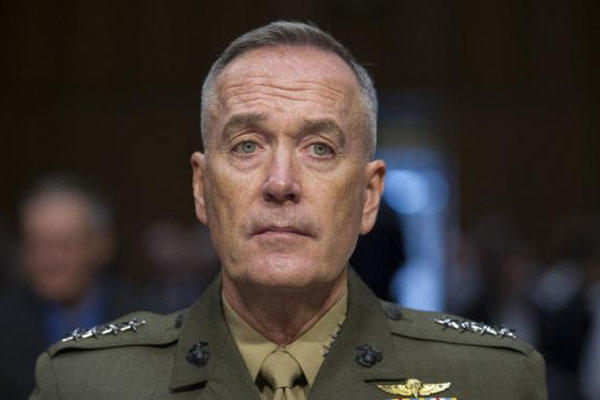The White House hit back Monday at Democrats and some Republicans who have charged that the role of Joint Chiefs Chairman Gen. Joseph Dunford on national security issues is being diminished while that of White House chief strategist Steve Bannon is being enhanced.
The Pentagon also sees no effort to sideline Dunford, who is by law the chief military adviser to the president, in the memorandum issued by President Donald Trump last Friday on access to meetings of the White House National Security Council. "Not in our view," said Navy Capt. Jeff Davis, a Pentagon spokesman.
In a lengthy and combative opening statement to his daily briefing, White House Press Secretary Sean Spicer said it is "nonsense" to read into the Trump memo any intention to downgrade the important role of Dunford or detract from Trump's high regard for the chairman.
"There's been a lot of misreporting this week about what this memo does and does not do, so let me walk you through this real quick," Spicer said.
The memo said that Bannon, the former publisher of Breitbart News and a key adviser to Trump during the election campaign, would become a regular attendee at the "Principals Committee" meetings of the NSC, which is headed by retired Army Lt. Gen. Michael Flynn.
The memo also said that the presence of Dunford and the director of National Intelligence, who has yet to be named, would be required only "where issues pertaining to their responsibilities and expertise are to be discussed."
"The principals committee is merely the NSC minus the president," Spicer said. "The idea that the chairman of the Joint Chiefs of Staff and the DNI are being downgraded or removed is utter nonsense.
"They are at every NSC meeting and are welcome to attend the principals meetings as well," he said. "To be clear, the memo lays out that if there's a principals meeting that is outside their scope -- for example, a domestic issue that doesn't pertain to the military -- they're not required but certainly welcome to be in attendance."
"The president holds Chairman Dunford in the highest regard," Spicer said. "The suggestion that he would downgrade the important role that the chairman plays in matters of national security reveals a fundamental misunderstanding of the tremendous respect that the president holds for both the chairman himself and the Joint Chiefs as a whole."
Much of the criticism of the memo focused on Bannon, who called the media the "opposition party" in a New York Times interview last week and has been associated with the far right movement known as the "alt right."
On ABC-TV's "This Week" program Sunday, Spicer said that Bannon, who was a junior officer in the Navy from 1976-83, would bring valuable military experience to NSC meetings.
"Well, he is a former naval officer," he said of Bannon. "He's got a tremendous understanding of the world and the geopolitical landscape that we have now."
Spicer said, "Having the chief strategist for the president in those meetings, who has a significant military background, to help make, guide what the president's final analysis is going to be, is crucial."
Later on the same ABC program, former Defense Secretary Robert Gates, a Republican whose service as defense secretary overlapped in the administrations of former Presidents George W. Bush and Barack Obama, voiced concerns about the shake-up at the NSC.
"My biggest concern is there are actually, under the law, only two statutory advisers to the National Security Council and that's the director of Central Intelligence, or the DNI, and the chairman of the Joint Chiefs of Staff. I think pushing them out of the National Security Council meetings, except when their specific issues are at stake, is a big mistake," he said.
Susan Rice, Flynn's predecessor at the NSC, went on Twitter to castigate the Trump memo. "This is stone cold crazy," she said. "After a week of crazy. Who needs military advice or intell to make policy on ISIL, Syria, Afghanistan, DPRK?" ISIL referred to the Islamic State of Iraq and Syria and the DPRK to North Korea.
"It's of concern, this reorganization" of the NSC to include Bannon, Sen. John McCain, an Arizona Republican and chairman of the Senate Armed Services Committee, said on CBS-TV's "Face the Nation" program.
McCain called the new NSC arrangements a "radical departure" from the past. "I am worried about the National Security Council," he said.
-- Richard Sisk can be reached at Richard.Sisk@Military.com.































